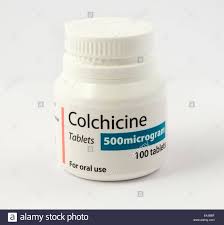- Colchicine,a plant alkaloid, is used for the treatment of acute gouty arthritis.
It is neither uricosuric nor an analgesic agent,but it relieves pain in acute attacks of gout.
Therapeutic uses:
- Gout:Colchicine is anti-inflammatory that’s why it is used as prophylactic agent to prevent acute attacks of gout in patients initiating urate-lowering therapy.
- Behçet’s disease:Colchicine is also used as an anti-inflammatory agent for long-term treatment of Behçet’s disease. It appears to have limited effect in relapsing polychondritis, as it may only be useful for the treatment of chondritis and mild skin symptoms.
- Pericarditis:Colchicine is also used in addition to other therapy in the treatment of pericarditis
Mechanism of action:
There are various mechanisms by which colchicine may interfere with gout inflammation:
- Inhibits microtubule polymerization by binding to tubulin, one of the main constituents of microtubules
- as availability of tubulin is essential to mitosis, colchicine may inhibit mitosis
- Inhibits activation and migration of neutrophils to sites of inflammation
- Interferes with the inflammasome complex found in neutrophils and monocytes that mediate interleukin-1β activation, a component of inflammation
- inhibits superoxide anion production in response to urate crystals
- Interrupts mast cell degranulation
Adverse effects:
It may cause;
- Nausea
- Vomiting
- Abdominal pain
- Diarrhoea
Chronic administration may lead to following conditions;
- Myopathy
- Neutropenia
- Aplastic anemia
- Alopecia






